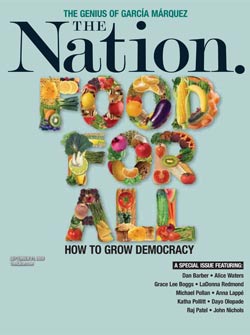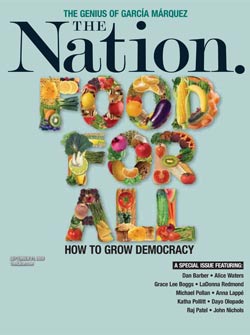 The food movement is slowly waking up to the fact that it has long treated the workers who plant and pick our food as if they were invisible. So it was with great anticipation that I read The Nation’s food issue, sure that a magazine with such a solid commitment to worker dignity would drive home the message that human and labor rights are integral to true sustainability.
The food movement is slowly waking up to the fact that it has long treated the workers who plant and pick our food as if they were invisible. So it was with great anticipation that I read The Nation’s food issue, sure that a magazine with such a solid commitment to worker dignity would drive home the message that human and labor rights are integral to true sustainability.
Instead, I found the same tired recipe of chefs, celebrity analysts, and pro forma discussions of family farms and urban food access. This simply makes no sense in light of the well-documented human rights crisis in our country’s fields. Over three million farmworkers toil at the base of our food system under abysmal conditions. As U.S. Senator Bernie Sanders explains, “The norm is a disaster; the extreme is slavery.” Yet despite this brutal reality in the fields where our fruits and vegetables are picked, workers were again absent in the discussion of our food system. Not one farmworker, or meatpacking worker for that matter, was given an opportunity to speak to the exploitation behind the food we eat.
And that’s a shame because those same workers are forging innovative solutions to the exploitation they face daily. For example, the Florida-based Coalition of Immokalee Workers (CIW) is spearheading a remarkably successful campaign to boost thousands of tomato pickers’ wages by promoting socially responsible purchasing in the retail food industry. These changes are putting millions of dollars back into one of the poorest worker communities in the U.S. and institutionalizing a voice for labor in an industry that has traditionally viewed its employees as disposable tools or worse.
This is certainly a story worth telling, and it is disappointing that The Nation missed a golden opportunity to do so.


